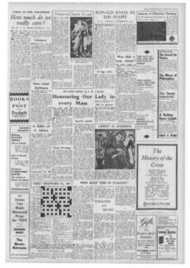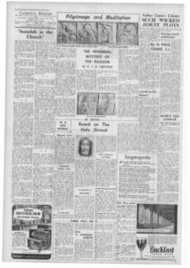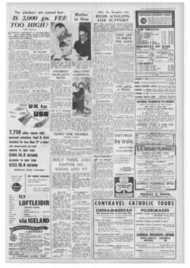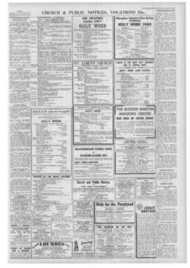Page 6, 8th April 1960
Page 6

Report an error
Noticed an error on this page?If you've noticed an error in this article please click here to report it.
Tags
Share
Related articles
Approaches To The Drama
Even•such Is Time
Rescuing The Liturgy
World Of Longer Shadows
• Heaven And Hell On The Air
They forgot the moral angle
By EVE MacADAM
GRANADA'S programme on
venereal disease, "The Shadow of Ignorance," cast another and deeper shadow behind it. This was the supposition, caused by certain omissions, that personal responsibility isn't important. Venereal disease is the result of promiscuity, and since the programme was dealing with human beings. not animals, the moral issue should have been discussed, but never was. The total disregard of what is, in the minds of ordinary people. the most important facet of this question, created a sense of bewilderment.
Produced factually and clinically, the programme was introduced by Jo Grimond. M.P., who stated at the outset Granada's reasons for presentation. Knowledge of venereal disease was essential, he said, because it was increasing alarmingly in this country. He then stated It can happen to anyone." Not "anyone who is promiscuous." but Anyone.
MISSING
AT the end of the programme, Jo Grimond blandly pointed out : " You've noticed there is one thing we have not done—we have not discussed morals." His excuse ? Not enough time on the programme. But surely this'question of moral responsibility is implicit in the topic, and however "free" one or two •teenagers may be, this attitude simply does not exist in the rest of them, nor among 99 per cent of the ordinary adult population of this country.
In duty bound I sat the programme out, and when it ended opened the windows wide. Fearing I could not give an impartial view, I contacted Father John Hebb, the Catholic Adviser to ATV. He said : "Although I personally wouldn't have put on this programme, we are to have this type of feature anyway. and it's true people ought to be warned about V.D. But we must be aware of the ill content of these programmes, that is knowledge without moral content.
" If you talk about V.D. from the clinical angle, you must also discuss it from the moral one. The teenagers talked about freedom. But is this freedom? Isn't it licence? If anyone indulges in casual liaisons he lessens his humanity. Conscience becomes deadened, and in the end he ceases to see promiscuity as wrong." •
HOPPING
CERTAIN types of people, and certain types of plays and discussions are better suited to sound than television. There is something about Vic Oliver's voice, mischievous and debonair, that makes it a natural for sound.
• Channel-hopping on Saturday at 8 p.m., I sampled the offerings of all three variety programmes. It was Vic's story, in Variety Playhouse about the man and his steam roller that made me laugh most.
As for Ken Dodd's Show on BBC—I accept his own definition that it was " laughless humour." Benny Hilt on ITV's Bernard Delfont Show provided ingenious skits, amongst them a very funny one on "Arson's Guide to Nudists," which depended on a double gate for laughs. His takeoff on " Ernest Minim" and guest star " Vivien Eagle" was maliciously finny. I laughed, even though I'm all for Ernest Maxin and Anna Neagle.
The success of Henry Cecil's adaptation of his new book, "Alibi for a Judge," in Saturday Night Theatre, owed much to the range of Ernest Milton's voice. As the Judge with a guilt complex, he used the inflections of his voice to create different aspects of the judge's character; softly-spoken cattiness, harsh bad temper, and best of all, the hesitant speech of doubt and anxiety of a small boy who has done wrong and wants to own up.
COMING
OF interesting programmes ahead, the Third on Wednesday at 8 p.m. offers an unusual biography—that oi Blind Tom, the Negro musical child prodigy who was the blind child of a slave couple. He achieved renown during the latter half of the last century.
Blind Tom introduced realistic imitations of train whistles, rusty machines working, cocks crowing, into his recitals of Chopin and Beethoven which shocked but delighted audiences in Europe and America.
blog comments powered by Disqus









